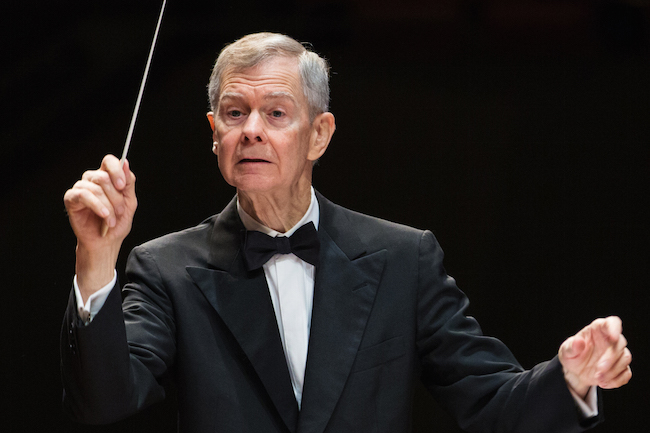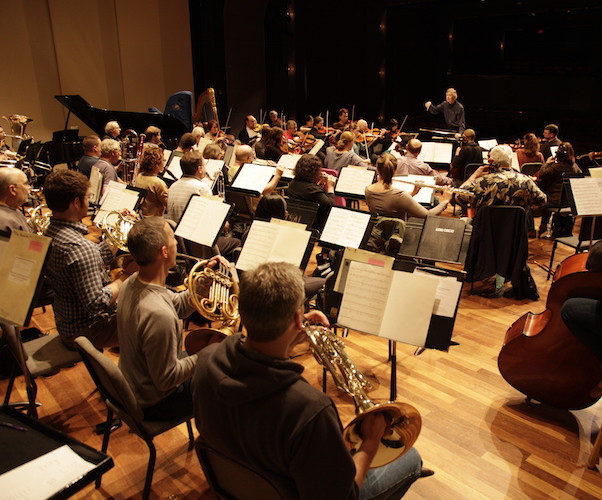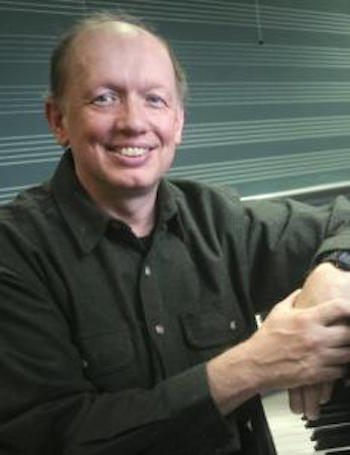Music Commentary: New England Philharmonic at 40
Whatever challenges there may be, the enthusiasm of the New England Philharmonic’s leadership is infectious.

Richard Pittman, the orchestra’s conductor since 1997, has a knack for creative and auspicious programming. Photo: courtesy of New England Philharmonic.
By Jonathan Blumhofer
From Tanglewood to the Handel and Haydn Society and the Longy School of Music, there have been a spate of important anniversaries for local musical institutions of late. One of this year’s most notable belongs to the New England Philharmonic (NEP), which marks its fortieth season with a special performance of Michael Tippett’s secular oratorio A Child of Our Time on March 4th at Boston University’s Tsai Performance Center.
The NEP isn’t the area’s only volunteer orchestra, but it’s surely one of the more prestigious, as its tackling of A Child of Our Time attests (for the event, the ensemble is joined by a quartet of leading soloists and Chorus Pro Musica). The oratorio – a meditation on man’s inhumanity to man that was triggered by the composer’s response to Kristallnacht in 1938 – is perhaps a surprising choice for a celebratory event. But it’s an apt one. While the score, says NEP music director Richard Pittman, is “a product of its time, the parallels between Tippett’s time of our time are uncanny. All of Tippett’s themes are uncomfortably applicable to today, in the world and in our own country. When I chose the Tippett a year ago, I did not anticipate how timely it would also be for us [now].”
For those who’ve watched the NEP for a while, though, that resonance isn’t necessarily surprising. Pittman, who’s been the orchestra’s conductor since 1997, has a knack for creative and auspicious programming. Still, he tells me that it’s not nearly as easy as it appears. “I agonize over programs,” he says. “I have to consider so many details: music and composers that need to be heard; music that will attract volunteer musicians and be good for their development as an ensemble; music that will attract and uplift an audience; a wish not to bore the audience, the orchestra, or me. Individual programs usually start with a work or composer that particularly inspires me and that leads to works that will somehow connect to one another. I’m looking for a balanced repertoire – my tastes are catholic. Each piece needs to be really strong. There’s no formula that I use. Instinct is the biggest factor in the choices I make.”
Pittman’s instincts are sharp: he and the NEP well have been recognized nationally (with five ASCAP awards for Adventurous Programming during his tenure; the ensemble one four more under Pittman’s predecessor, Jeffrey Rink) as well as garnered much local praise. Saturday’s concert demonstrates this to a point: the Tippett is only the evening’s culminating event. Before it comes the world premiere of Richard Cornell’s Melospiza melodia and a rare performance of Gunther Schuller’s early Vertige d’Eros.
The orchestra’s April season finale stretches Pittman’s programming abilities further and a bit more typically. There are two world premieres, the first being Peter Childs’ Fanfare, written (along with the Cornell and Andy Vores’ Xylophonic, the latter heard in October) by a former composer-in-residence for the orchestra’s anniversary season. The other is by the NEP’s current composer-in-residence, David Rakowski: his Violin Concerto no. 2, composed especially for the orchestra’s concertmaster, Daniele Maddon. If this isn’t enough, there’s also the Boston premiere of Liliya Ugay’s Oblivion, the winner of the NEP’s annual Call for Scores, as well as substantial pieces by Aaron Copland, Sebastian Currier, and Zoltan Kodaly.
It’s a dynamic blend of past, present, familiar, and unknown that drives the engine of the NEP’s multi-pronged mission. “We wanted to show off the high quality of our composers in residence,” Pittman notes of the season’s three fanfare commissions, “all of whom have worked very hard for us, and to show our appreciation and pride in their association with us in our fortieth anniversary.”
As for Ugay’s prize-winner, it addresses the vital need for championing new music, an activity in which the NEP is one of only a handful of orchestras, nationally, to really invest itself. “The Call for Scores,” Pittman explains, “exposes me, the orchestra, and the public to worthy people that would otherwise remain unknown to us and fulfills a sacred obligation to give composers a hearing.”
And then there’s the orchestra’s more local outreach, exemplified by the its annual Family Concert, which, usually in addition to a premiere or two and a standard work, features the winner of the orchestra’s Young Artist Competition (YAC). “The YAC gives highly talented, hard-working young people encouragement by giving them a public performance with an orchestra,” Pittman says. “These winners also show the young people in our Family Concert audience what is possible to achieve by someone their own age with discipline and hard work.”
Together, it adds up to broad and, in some cases, rather heady stuff. But, then again, Pittman is a musician of high ideals and principles. “For me, as for most musicians,” he’s quick to point out, “music is not a ‘relaxation.’ Classical music is an uplifting example of the best of what human beings can create. Moreover, the experience of a group of musicians performing a work created by another human being with a God-given creative gift for another group of people who are listening and sharing a communal experience of mutual enrichment is nurturing for all. This three-way partnership – composer, performer, listener – is the only way that music can exist and I’ve always taken great satisfaction in that.”

The New England Philharmonic in action. Photo: courtesy of New England Philharmonic.
He’s also taken much satisfaction from his orchestra itself. “The NEP has improved musically and technically” during his tenure, Pittman says, reflecting with his nearly two decades with the group. “Its members now have a much more serious and responsible attitude than when I started. This is important to me as an orchestra builder. The addition of Daniele Maddon as concertmaster has been a very positive factor in this development. I’m also pleased that this volunteer orchestra is frequently assumed to be professional by some of the composers we perform.”
That last point is reflected in their repertoire, which regularly includes ambitious, substantial works more closely associated with fully professional ensembles like the Boston Symphony Orchestra. “Some ‘big’ anniversary works we’ve performed have turned out very well,” Pittman recalls. He ticks off an impressive list: “Britten’s War Requiem, Berg’s Wozzeck, Bartók’s Bluebeard’s Castle…I’m also proud of our composers-in-residence and many of the works they’ve written for us. Proud of having Gunther Schuller as Composer Laureate and for having performed many of his earliest and seldom-performed works, particularly his Cello Concerto and The Past is in the Present.”
He’s equally-pleased with the audience-building the NEP’s diligently worked at over the years. One of his goals, Pittman points out, is to help broaden the audience for living composers and what he broadly calls “good music.” “It pleases me tremendously,” he says, “that some of our listeners have increasingly become more appreciative of ‘new music’ and enjoy the exposure to unknown repertoire.” He continues, “I also want the audience to realize that music, like all aspects of culture, is a part of a continuum of one generation leading to the next – it’s an organic development. Everything ‘new’ has some connection to the past.”
*****

New England Philharmonic. Photo: courtesy of New Philharmonic.
If any member of the NEP understands that goal, it’s probably the orchestra’s concertmaster, Daniele Maddon. A frequent presence with local orchestras and chamber groups, she’s involved in a dizzying amount of music-making in the area, including regular appearances as a soloist with the NEP. How do her myriad musical roles help her collaboration with Pittman and the NEP?
“It is a wonderful challenge and a growth opportunity,” Maddon tells me, referring to her triple-life as violin soloist, orchestral player, and chamber musician. “And they’re all rather different skill sets. For example, playing in violin sections has its own specialized skills involving careful blend and a precision ‘school of fish’ or team execution. Chamber music uses these skills as well, but adds the development of your individual voice to the discourse. Concerto playing really highlights your individual voice, viewpoint and technique, your values as a musician, assertive leadership and collaboration, and invokes your utmost boldness and concern for the composer’s music to be heard and understood. You really have to do a ‘deep dive’ into each work, preparing for months, finding solutions to new technical issues, hard-wiring it into your brain and sinews, and then it is over in one night! Like a marathon.”
But it’s apparently somewhat addictive, as Maddon’s repertoire attests. She’s played the Berg Violin Concerto twice with the NEP; among her personal highlights are performances of Henri Dutilleux’s L’arbe des songes, concerti by John Harbison and Earl Kim, plus pieces written for her by Andy Vores and Bernie Hoffer. This year brings yet another new piece for Maddon, in the form of composer-in-residence Rakowski’s new concerto.
“I have heard Dani play the Berg [Concerto] twice now,” he says, “and I’ve been hearing her play now for several years, leading the violin section, playing other concertos and solo parts…so I was definitely thinking of her playing [while writing the new concerto].
To spend any time talking with Rakowski – even via email – is to converse with one of the smartest and slyly funny composers around. His music often reflects this blend of intellect and humor and, from his description of the upcoming concerto, it sounds as though the new work will be filled with his trademark cache of oddball ideas and gestures.
“Dani’s playing, together with screwy ideas I get for pieces, come together here,” he tells me. “For instance – I thought to myself what would a violin concerto movement sound like if the soloist and the entire string section played only pizzicato in one whole movement? I had to write the piece to find out. Meanwhile, writing the slow movement made me think of that solo movement [in Rakowski’s Dance Episodes]; and then a scherzo in compound meter, something that I have never done for orchestra. I guess that scherzo movement is the most traditional of the concerto’s movements, though.”
Both Maddon and Rakowski have rather serendipitous connections to the NEP – especially the latter. “It turns out my wife played clarinet and bass clarinet in the orchestra for a short time in the 1980s,” he remembers. “The first time I heard the NEP play was in 2001 when a friend of mine had won the call for scores, and I went to the concert with her piece on it; Dani did the Berg Violin Concerto on that concert, which I though was pretty good! My wife was at that concert, noting that she had played in the Berg Violin Concerto with the orchestra, too.”
Maddon came to the ensemble on the advice of her teacher, Bayla Keyes. “I heard they needed a concertmaster,” she says, “and Bayla recommended that we try each other out. The first year was baptism by fire, with Hindemith’s Symphony Mathis der Maler – the first violin part is unrelentingly ferocious – and my solo performance that year was Lutoslawski’s Chain 2. We did well, and decided to keep going together.”
For both, though, the experience of working with the orchestra and, especially, Pittman, has been strongly positive.
“Dick is a fabulous musician and a great human being,” Maddon raves. “He has the ability to bring clarity to even the most difficult issues of rhythm, meter and tempo. And he looks for the opportunity for a singing line to emerge when appropriate. His standards are high, but he is also kind and patient during the learning process with the orchestra.”
In addition to writing for the NEP, Rakowski’s responsibilities include adjudicating the annual Call for Scores, a process, he says, that can be both a joy and a trial. “The quality is all over the map,” he notes. “The top eight or ten [entries] are always fantastic, and the bottom fifty or so just don’t do anything for me. The overall quality has been fluctuating like a sine wave. My second year was an amazing year, as was last year. The other years have been more uneven.”
But the process has been considerably streamlined since Rakowski took over in 2011.
“When I started, I got two or three enormous boxes of physical scores and CDs,” he recalls, “and it is a long process of listening to several excerpts in each score submitted (or reading the score if there is no recording), putting aside the ones with promise into the “maybe” pile. This culls the 120 or so applications down to fifteen or twenty. Then I spend an afternoon listening to each piece from start to finish, and deciding which four or five are the best music, and that are also appropriate for the orchestra. Then I mail the scores and CDs to Dick, a week later we have a long talk, and mutually agree on the winner.
“Since 2014, submission has been completely online, so I can do it from the comfort of my own computer. The process is, however, the same, though it’s made faster by not having to fetch physical scores and CDs from a mailing bag and putting them back. Now what I do is print the PDFs and bind them, and burn the sound files onto CD and mail them to Dick. Then we have the same long talk.”
Still, it’s a process that offers its share of rewards: “Meeting the composers we choose, taking them out for lunch, getting to know a composer I hadn’t known before” are all perks.
So is writing for the NEP, which affords him some singular creative opportunities.
“Writing three symphonies for the orchestra has been a lot of fun,” he says. “The orchestra has been a great playground for trying out screwy compositional ideas I might be having – such as layering in quotes from well-known pieces, or writing as if for dance.”
What’s next for him and the orchestra? “Perhaps a seventh symphony. I haven’t started thinking about that piece yet…but if I get the right kind of screwy idea” – that key Rakowski ingredient – “I’ll probably get right on it.”
*****

David Rakowski, NEP’s current composer-in-residence, one of the smartest and slyly funny composers around. Photo: courtesy of New England Philharmonic.
“If you want a really broad musical experience,” Maddon says, “you are in the right city! We’ve got high-quality groups in the Boston area studying and performing music from the Medieval, Renaissance, and Baroque periods right up to music written last month. As a classical violinist, much of the work here in town involves chamber orchestra-sized groups, often with chorus. But what if you also want to learn and perform big orchestral works from historic masterpieces to current compositions? This is the part of my musical life that the NEP fulfills.”
It’s a special niche the ensemble occupies, to be sure. And, while it’s earned a devoted following and critical praise over the years, there’s remains room for growth.
“I’m so preoccupied with learning my scores, with rehearsing and with preparing the upcoming concert, that I’ve not thought ahead,” Pittman replies to a question about what lies next for his orchestra. “I do know that I want to continue to improve the orchestra, to help put the NEP on firmer financial footing and to increase our audiences. We need to increase the membership of our board and to be able to afford a full-time manager.”
Whatever challenges there may be, the enthusiasm of the orchestra’s leadership is infectious. “I do this because I want to learn as many facets of music as possible,” Maddon tells me, “new as well as old, with great colleagues and a conductor who encourages us to grow as musicians.”
And the NEP’s not about to take its audience for granted. “Thank you for opening your minds and ears, and for your willingness to try something new,” Maddon says when asked about the ensemble’s following. For those new to the NEP, she adds, “Enjoy the program, give your attention to it, watch carefully as well as listen, and realize that everyone onstage collaborates to give the audience and ourselves a unique, in-the-moment, once in a lifetime experience.”
Right now, though, the focus is on this weekend’s concert – then the big spring finale (also at Tsai on April 29th). Pittman’s excited about both of them: “I’m looking forward to doing a number of composers for the first time in our final concert, to the Tippett, and to doing Schuller’s beautiful second orchestra piece, written when he was nineteen, along with the Tippett.”
And so it goes: the busy, but satisfying, life of conductor and orchestra and an anniversary season soon to be in the books. Then it’s on to the next.
Jonathan Blumhofer is a composer and violist who has been active in the greater Boston area since 2004. His music has received numerous awards and been performed by various ensembles, including the American Composers Orchestra, Kiev Philharmonic, Camerata Chicago, Xanthos Ensemble, and Juventas New Music Group. Since receiving his doctorate from Boston University in 2010, Jon has taught at Clark University, Worcester Polytechnic Institute, and online for the University of Phoenix, in addition to writing music criticism for the Worcester Telegram & Gazette.
Tagged: " Michael Tippett, "A Child of Our Time, Daniele Maddon, David Rakowski, New-England-Philharmonic

Jonathan, you’ve done a fabulous job capturing the essence of the NEP and all the best of Dick Pittman, Dani Maddon and David Rakowski — all treasures who make the NEP what it is today. I hope people will come in droves on Saturday evening after they read what you’ve written. Thanks so much! Ann Teixeira, NEP Board President